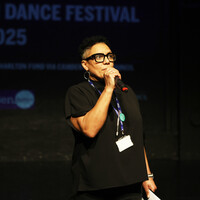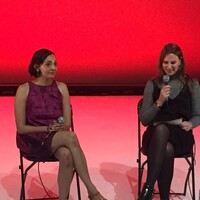"I can't imagine a dance industry without dance writing" - an interview with Resolution Reviewers 2022

News Story
Resolution Review, part of Resolution our annual festival of new choreography, is a unique programme where writers interested in writing about dance can be mentored by professional dance critics. Over the years the programme has produced some of the top dance writers in the UK: Lyndsey Winship, Ka Bradley and more. In this Q&A we hear from the writers who took part in this year’s Resolution Review: Olivia Foskett, Jodie Nunn, Sarah-Mace Dennis, Iris Kilian and Janejira Matthews, who chat about what they learnt and how the programme has inspired them.
A: What are your reflections on this experience?
Olivia: Reflecting on the Resolution Review experience, I feel very grateful that I got to be a part of it. It was such a great opportunity and our mentors gave such great advice. It has definitely given me the motivation to solidify my style and build my confidence as a writer.
Jodie: Not only was it great to work with renowned critics and have your name next to them, it felt brilliant to be part of the dance writing community.
Sarah: It was also great to be given accountability in such a short timeframe. I have never done that kind of writing where you really have to produce something so quickly. Like Olivia, I think the mentors were very generous with their advice.
Iris: I really enjoyed spending time with the mentors during the interval where we got to witness the critics’ thought processes and see how they worked. It was great to see how they do it!
Q: Dance journalism is changing, with historic publications such as Dancing Times and DanceTabs closing. Do you think dance writing still has a place in the industry?
Sarah: Performance is ephemeral and in most cases the show is the only thing that exists. Not only is it important for performers to have a dialogue around their work, but it’s key to archive dance. The review exists as part of the work, and so I can’t imagine a dance scene without dance writing.
Janejira: Sometimes it is a case where people can’t afford to go and see a performance, so a review makes dance more accessible. In that way, dance writing is important to the industry if we want to attract people from different backgrounds.
Jodie: I feel like dance writing is an extension of dance in a way. When I write, I try to write in the essence of the performance so that when someone reads it, they can feel the piece. I’ve read a lot of reviews that are like that.
Q: Could dance writing be explored in different forms?
Iris: I think new formats like TikTok will do their own thing and provide something separate to what dance writing brings. The question is whether they can really translate the feelings you have about a performance in the same way that writing does…
Sarah: If we’re thinking about decolonising arts writing, the written form does feel a little colonial in its modality of observation, I guess. In that sense it’s nice to embrace new ways of engaging with dance.
Q: How did you feel about writing about different dance work from different cultures?
Janejira: I’ve been doing a lot of research for my masters and I'm working on Thai culture, which is my own. But then last year, I did more research into Japanese culture, which obviously isn't my own culture. I think it's really important to be writing about different cultures because otherwise how are you going to expand your own knowledge? I think the thing is to do it in an informed, genuine way, rather than going on first impressions.
Q: What’s next for you all?
Olivia: As a dancer, I’m thinking about how dance and dance criticism can coexist. It’ll be interesting to explore this going forward…
Jodie: I finished my masters in January so I’m looking at getting into academic writing and dance criticism, and then furthering my own teaching practice and choreography.
Janejira: I want to research more academic opportunities as I want to get into lecturing and research.
Iris: My career is in a different field, but Resolution Review really inspired me to take the time to build up the confidence to write, see performances and publish reviews online. I’d like to get a portfolio together and start pitching ideas.
Sarah: As well as teaching at universities, I’ve been doing a lot of academic writing. I have just submitted a new proposal to the Routledge Companion to Medicine and Performance where I wanted to write something that breaks with academic conventions. I’ll also do more pitching to arts publications and explore my critical voice more. Resolution Review definitely helped me begin to craft it.


